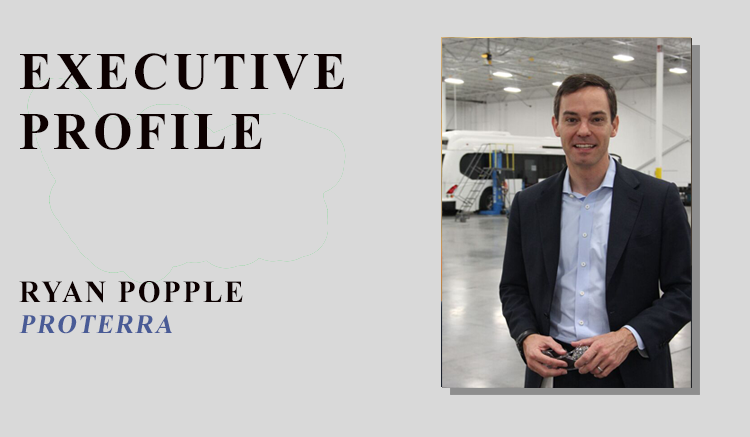Armed with a formidable academic and working background, Proterra CEO, Ryan Popple, is helping the Greenville-based electric bus manufacturer become the transit provider of the future.
Popple brings a wealth of experience in scaling advanced transportation technologies and is responsible for overseeing all aspects of Proterra’s operations including sales, marketing, parts and service, logistics, communications and customer support.
Before joining Proterra, Popple was instrumental in the successful capitalization of Tesla Motors and the commercialization of its first-in-kind Roadster.
During his tenure as senior director of finance, the company scaled from pre-revenues to $100M+ in vehicle revenue, received an Advantaged Technology Vehicle Manufacturing loan from the Department of Energy, completed multiple private equity financings, reached profitability and achieved an IPO filing.
In this role, Popple worked closely with engineering, supply chain and manufacturing teams to increase the Roadster’s performance and quality, while leading the development of Tesla’s innovative consumer financing and leasing programs.
Committed to moving the industry forward, Popple serves on the EV Strategic Council working on long-term strategic planning for the transition to clean vehicles.
He also serves on the Transportation Committee of the Silicon Valley Leadership Group focusing on policy advisory at the federal, state and local level to advance clean energy and other transportation technology.
The Proterra CEO holds a bachelor of business administration degree in finance from the College of William & Mary and received an M.B.A. from Harvard Business School, where he was a Baker Scholar.
Recently, Popple sat down with South Carolina Manufacturing to answer a few questions about his life and career.
1. What is your greatest challenge in 2016?
Getting through the backlog of orders. We’ve got orders for Seattle, Southern California, Kentucky, Dallas, and we are shipping our first orders to Minnesota. The challenge in 2016 is making sure we can respond to demand in a timely manner.
2. Since gas is so cheap and probably will stay that way, is it impacting the demand for Proterra busses?
It is not impacting demand because batteries have gotten cheaper much faster than crude oil. Another reason is that our customers are long term transportation planners. When they buy a vehicle, they need to operate the vehicle for over a decade. They are experienced professionals in the transportation, and no one in that industry would bet that gas is going to stay cheap. Energy markets have always been volatile, so no one is good at forecasting energy prices whether up or down. If you have to buy a bus and keep it operating for 12 to 15 years, the only thing you’ve ever known from the oil markets is volatility. The production side of the oil markets are sending a very clear signal that today’s prices will not sustain production.
3. What will happen if gas prices drop even lower?
The technology is getting to the point where the vehicles are going to be the same price as the combustion vehicles. Our electric motors are already cheaper than a big diesel engine, and the batteries are getting cheaper. We are getting to the point where two years of fuel would pay for the batteries. If the price is approaching equal and you can get a quiet vehicle with zero local pollution, it will be a simpler and cleaner way to operate. Diesel prices could go lower, but nothing will make it safer to breathe.
4. What is Proterra doing in regard to innovation and continuous improvement?
Innovation and continuous improvement are at the heart of this company. I think we are pushing this market harder than any other company in the space. We have already passed the goal line when it comes to having a superior total cost of ownership. We are already winning on pollution, greenhouse gas, acceleration, hill climb, and light weight. Each time we evolve the product, we are getting closer to the perfect product. We have the most energy-efficient 40ft transit bus ever made with the highest passenger capacity. We are showing where state-of-the-art is.
5. How is Proterra working on lowering the price point of the average bus?
I think we have led the market in reducing the cost of the electric vehicle. A couple of years ago, a Proterra vehicle and a fuel cell vehicle cost the same thing at about $1 million each. We’ve now taken almost $500,000 out of the production cost of these vehicles. We’ve already moved the price point of $1.2 million per vehicle to a fully-loaded Proterra vehicle for about $800,000. We have also changed the business model on how you can buy a bus. You can now buy a transit bus and lease the batteries. If you go with that model, the Proterra bus is essentially the same price as a natural gas vehicle and you sign a battery contract, and the lease amount per month is less than what you would pay on fuel.
6. What are your latest technological advancements?
The launch of the Catalyst, our second generation vehicle platform. The Catalyst can be manufactured in about a third of the time as its predecessors. Although it’s bigger, it is lighter by 2,000 pounds and acceleration and hill climb went up. Also, the amount of energy used per mile went down. The vehicle is designed around the energy storage system. When the Catalyst went through the federal testing program, it broke four records regardless of vehicle including Zero to 20 Acceleration, Maximum Percent Climb, Lightest Weight 40 ft. vehicle, and Most Energy Efficient 40 ft. Vehicle ever tested.
7. When you are not working, where can you be found?
If I’m outside I’m happy. I love to cycle and surf. I have three kids and doing stuff outside with them whether it is fishing or biking is great.


Be the first to comment on "Q&A: Ryan Popple, CEO, Proterra"